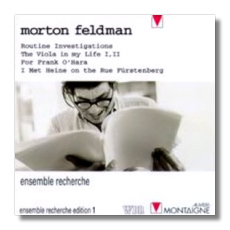
The Internet's Premier Classical Music Source
Related Links
- Feldman Reviews
- Latest Reviews
- More Reviews
-
By Composer
-
Collections
DVD & Blu-ray
Books
Concert Reviews
Articles/Interviews
Software
Audio
Search Amazon
Recommended Links
Site News
 CD Review
CD Review
Morton Feldman

Routine Investigations
- Routine Investigations
- The Viola in My Life I and II
- For Frank O'Hara
- I Met Heine on the Rue Furstenberg
Ensemble Recherche
Disques Montaigne MO 782018 DDD 60:26
The Feldman discography gets a boost with this important new collection from Disques Montaigne, an Auvidis label distributed in the United States by Harmonia Mundi USA. With an average playing time of about twelve minutes, these five works, which all were written in the 70s, seem like mere wisps, at least compared to the marathon works that Feldman was to write in the following and final decade of his life, but they leave neither an impression of incompleteness nor of inconsequence.
As Kyle Gann's helpful notes point out, these works are part of Feldman's return to subjectivity and "intuition," although I suppose that the use of the latter word is debatable, since it implies that Feldman's intellect should get rather less credit for successful outcomes than his instincts should. Earlier in his career, Feldman, like his friend and colleague John Cage, had used stochastic or scientific systems to maximize the composer's and the performer's musical objectivity, and to free music from ever-dangerous contamination by Western traditions and cliches. These systems led to so-called "chance music" and works like Cage's Atlas Eclipticalis, for example, where the pitches and durations are derived from an astronomical chart. Around 1970, Feldman changed directions and began relying more on his own exquisitely sensitive sense of balance and proportion rather than relying on objective systems. That's not to say that his music's overall structure would stop being at least semi-regular from that point on (Feldman spoke of "crippled symmetry" in the patterns of Asian carpets, in which a pattern would be repeated – but not precisely – over and over again, and he emulated that "crippled symmetry" in much of his later music), but Feldman took a lot of compositional control back at this time, and it is in this last period of his compositional life that Feldman's music became unique, distinctive, and spiritual.
These pieces are scored for six or seven players, some of them doubling on more than one instrument. Routine Investigation's scoring (oboe, trumpet, piano, viola, cello, and double-bass) is typical. In I Met Heine on the Rue Furstenberg, a wordless female voice is added, and the work's resemblance to Rothko Chapel, written in the same year and one of Feldman's central works, is obvious. Like Japanese sand gardens or Alexander Calder's mobiles, Feldman's works present difficulties for many listeners because there seems to be so little in them to take in. Their beauty lies in their structural and emotional economy, and in the challenge to listen deeply which this economy presents to us.
Ensemble Recherche is a German group that specializes in little-played music, and this is the first in a series of Disques Montaigne CDs that will bring their repertoire to a wider audience. They've been around for ten years, they look like students, and they play like Zen masters. These performances were taped in 1991-1993 by the West German Radio with excellent sonics. With several of these works not otherwise on CD (at least per Opus), this disc significantly adds to our knowledge about this fascinating composer.
Copyright © 1996, Raymond Tuttle


















